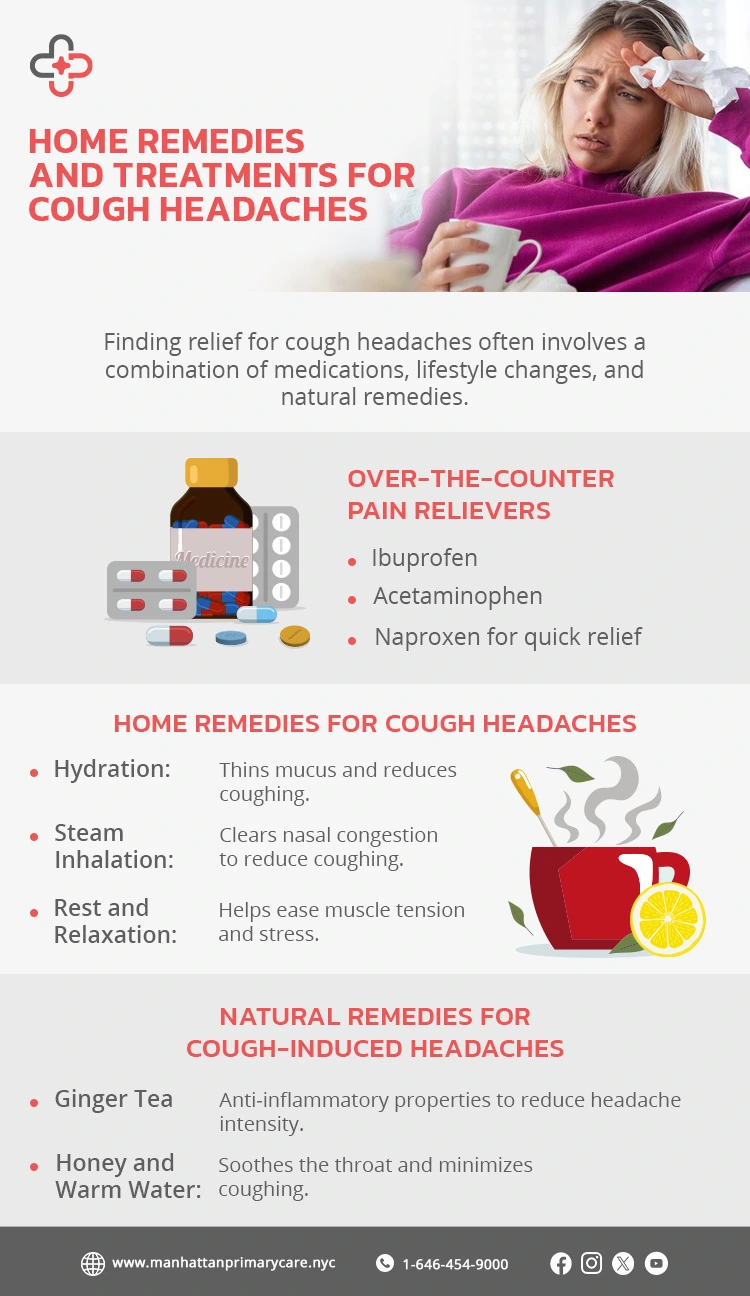Have you ever coughed, sneezed, or laughed, only to feel a sharp pain shoot through your head? It’s unsettling, and you might be wondering if it’s just a cold symptom or something more serious.
While often harmless, cough headaches can sometimes signal underlying conditions that require attention. Identifying the type of headache is key to finding the best treatment and prevention methods.
Why Does My Head Hurts When I Cough?
Feeling a sharp, sudden headache when you cough can be alarming, especially if it occurs frequently. This type of headache is often linked to pressure changes in your head caused by the force of coughing. While some cases are harmless and brief, others may signal an underlying medical condition that requires attention. Understanding the reasons behind this discomfort can help you manage symptoms and decide when it’s time to seek medical advice.
Primary Cough Headache
- Typically harmless and triggered by coughing, sneezing, or straining.
- Usually brief, lasting from a few seconds to minutes.
Secondary Cough Headache
- Linked to underlying conditions such as:
- Increased intracranial pressure.
- Chiari malformation (a structural defect in the brain).
- Cerebrospinal fluid (CSF) leak causing pressure imbalances.
Common Causes of Cough Headaches
- Acute illness such as colds, flu, or respiratory infections.
- Chronic coughing due to smoking, asthma, or allergies.
Types of Cough Headaches
Cough headaches are categorized as primary or secondary. Primary headaches are generally harmless, while secondary headaches may indicate a serious condition that requires medical attention. Recognizing these differences is key to managing your symptoms effectively.
Primary Cough Headache
- Often benign with no serious underlying issue.
- Sharp, sudden pain, especially in the back of the head.
Secondary Cough Headache
- Often accompanied by neurological symptoms such as:
- Vision changes.
- Dizziness or balance issues.
- Nausea or vomiting.
When to See a Doctor Seek medical attention if headaches are severe, prolonged, or accompanied by sudden neurological changes.
Common Symptoms of Cough Headaches
Cough headaches present differently depending on their type. Primary cough headaches are brief and sharp, while secondary ones can be persistent and severe. Identifying these symptoms early helps determine if medical attention is needed.
Primary Cough Headache Symptoms
- Sudden, sharp pain at the back of the head.
- Lasts for seconds to minutes.
Secondary Cough Headache Symptoms
- Persistent or worsening headaches.
- Vision problems or dizziness.
- Pressure-like pain that worsens with coughing or sneezing.
Home Remedies and Treatments for Cough Headaches
Finding relief for cough headaches often involves a combination of medications, lifestyle changes, and natural remedies.


Over-the-Counter Pain Relievers
- Ibuprofen, acetaminophen, or naproxen for quick relief.
Home Remedies for Cough Headaches
- Hydration: Thins mucus and reduces coughing.
- Steam Inhalation: Clears nasal congestion to reduce coughing.
- Rest and Relaxation: Helps ease muscle tension and stress.
Natural Remedies for Cough-Induced Headaches
- Ginger Tea: Anti-inflammatory properties to reduce headache intensity.
- Honey and Warm Water: Soothes the throat and minimizes coughing.
How to Prevent Cough Headaches?
Prevention strategies can significantly reduce the frequency and intensity of cough headaches.
- Address Chronic Coughing: Treat conditions like asthma, allergies, or sinus issues.
- Stay Hydrated: Thins mucus and reduces coughing frequency.
- Avoid Known Headache Triggers: Strong odors, sudden temperature changes, and stressful conditions.
- Practice Controlled Breathing Techniques: Reduces strain during coughing fits.
When to See a Doctor for Cough Headaches
At Manhattan Primary Care, we emphasize the importance of knowing when to seek medical help to prevent serious complications and ensure you receive the right treatment.
Seek medical care if:
- The headache is severe or prolonged.
- You experience neurological symptoms like vision problems or dizziness.
- The headache occurs with nausea, vomiting, or confusion.
Diagnostic Tests May Include:
- Physical Exam: To assess symptoms and triggers. In some cases, a stress test may also be recommended to evaluate cardiovascular health and identify potential risks.
- MRI or CT Scan: To rule out structural issues like Chiari malformation.
- Lumbar Puncture: To evaluate cerebrospinal fluid pressure.
Conclusion
Cough headaches are often harmless, but understanding the difference between primary and secondary types is crucial. Simple remedies like hydration, rest, and over-the-counter pain relievers can provide quick relief. However, if your headache is severe, recurring, or accompanied by dizziness or vision issues, seek medical advice promptly.
By knowing the signs, symptoms, and remedies for cough headaches, you can take control of your health and find effective relief quickly. If in doubt, don’t hesitate to consult with your healthcare provider for peace of mind and appropriate treatment.
Frequently Asked Questions
Can a cough headache be a sign of a heart problem?
Rarely, but persistent headache when coughing with chest pain may indicate a cardiovascular issue.
Are cough headaches linked to allergies or sinus issues?
Yes, allergies and sinus issues can trigger a cough-induced headache due to persistent coughing.
Why do I get headaches after sneezing or laughing?
Sudden pressure changes can trigger a headache after sneezing or coughing, especially in sensitive individuals.
Can dehydration worsen cough headaches?
Yes, staying hydrated can help prevent cough headaches by reducing coughing intensity.
How can I tell if it’s a cough headache or a migraine?
A cough-induced headache is brief and triggered by coughing, while migraines last longer with additional symptoms.
Disclaimer
This blog is for informational & educational purposes only and does not intend to substitute any professional medical advice or consultation. For any health-related concerns, please consult with your physician, or call 911.
